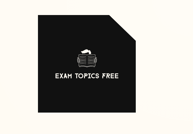
Exam Topics Free
Building a supportive study network fosters motivation and a sense of shared responsibility for success. Regular Self-Assessment
Periodicself-assessment is crucial to gauge your progress and identify areas thatrequire further attention. Create quizzes or self-tests based on the materialyou've studied and critically evaluate your performance. Adjust your study planbased on the results, focusing on weaker areas. Regular self-assessment notonly reinforces learning but also enhances your ability to adapt and refineyour study strategies as needed. Mindfulness and Stress Management: Exam stressis a common challenge, but incorporating mindfulness techniques can mitigateits impact. Practice mindfulness through activities like meditation, yoga, orsimple breathing exercises to stay focused and calm. Recognize and challengenegative thoughts, and cultivate a positive mindset. Developing effectivestress management skills is integral to studying smart, as it ensures that youapproach exams with a clear and composed mind. In the pursuit of academic excellence,studying smart, not hard, has emerged as a guiding principle for students. Byunderstanding exam topics, developing a well-structured study plan, andincorporating active learning techniques, students can optimize their studysessions and enhance their overall learning experience. Utilizing technology,practicing with past papers, and managing time effectively contribute to astrategic approach to exam preparation. Healthy lifestyle choices,collaborative learning, regular self-assessment, and mindfulness techniquesfurther bolster the effectiveness of smart studying. As students embrace thesestrategies, they not only increase their chances of success in exams but alsocultivate lifelong learning skills that extend beyond the classroom.
